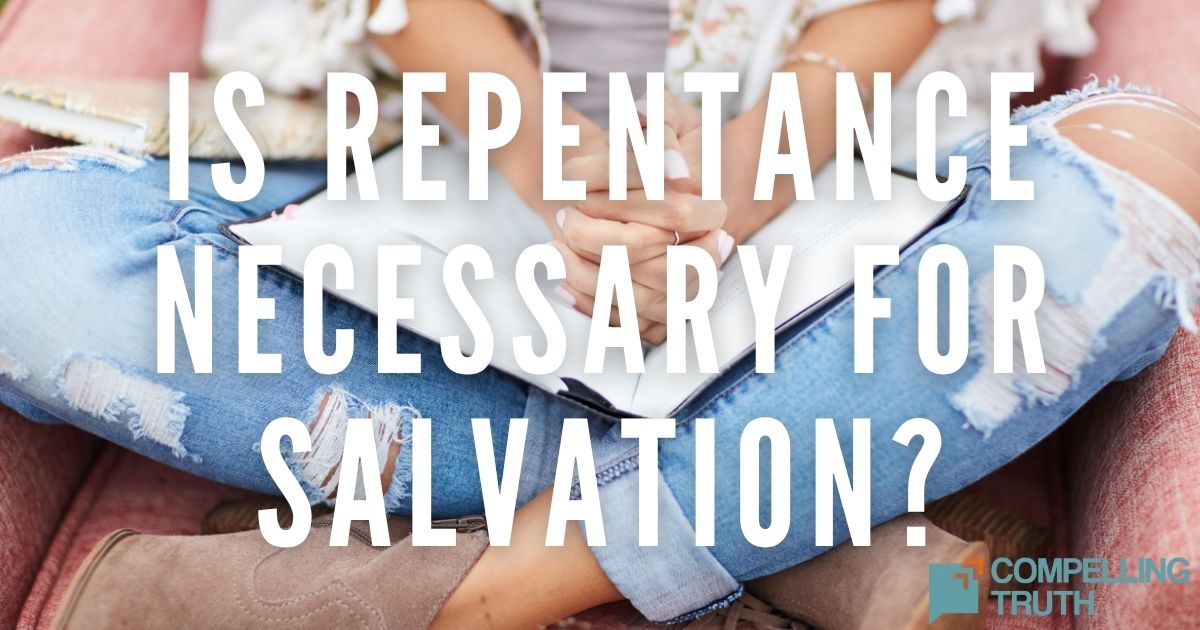In the original languages of the Bible, the word "repent" paints a word picture that explains its original meaning. For instance, in Hebrew, the word means "to turn the other way, especially in the context of returning to the starting point." So "repent" in Hebrew means to turn away from sin and turn toward God in a restored relationship like it was in the beginning of creation. In Greek, the word means "to think differently about something afterwards, to reconsider and change one's mind." So "repent" in Greek means to agree with God about the sinfulness of a past action or attitude and then to live in such a way that aligns with this new belief.
In 2 Chronicles 7:14 God said, "if my people who are called by my name humble themselves, and pray and seek my face and turn from their wicked ways, then I will hear from heaven and will forgive their sin and heal their land." In this statement, God delineated what repentance looks like. First there has to be a humble attitude, an attitude that recognizes that God is holy, sovereign, and just, and that His ways are higher than mine (Isaiah 55:8–9). Humility is an agreement that I have failed to meet God's perfect standards. The next step God instructed for His people is to pray. In the act of praying to God, I turn my focus and attention away from myself and to God. Thirdly, I am to seek His face, to know God not only in His holiness, power, and glory, but also to know Him personally and intimately. Finally, after humbling myself, turning my attention to God, and encountering Him personally, God called me to turn from my wicked ways. Recognizing my own failures and limitations and experiencing God's power and love then enable me to walk away from my sin.
In Ezekiel 18:30b–31a God called His people to "Repent and turn from all your transgressions, lest iniquity be your ruin. Cast away from you all the transgressions that you have committed, and make yourselves a new heart and a new spirit!" Knowing that as humans we are incapable of changing the sinful inclinations of our own hearts, God promised, "And I will give you a new heart, and a new spirit I will put within you. And I will remove the heart of stone from your flesh and give you a heart of flesh. And I will put my Spirit within you, and cause you to walk in my statutes and be careful to obey my rules" (Ezekiel 36:26–27). God promised to put His own Spirit within us to empower us to walk in His ways (Romans 8:9–14, Galatians 5:22–25). If you have put your faith in Jesus, you have the indwelling Holy Spirit (Ephesians 1:13–14). Second Corinthians 5:17 says, "Therefore, if anyone is in Christ, he is a new creation. The old has passed away; behold, the new has come."
King Solomon gave his people a model for repentance when the Ark of the Covenant was brought into the newly finished temple. In his prayer of dedication, he asked that when the people sinned against God and were carried away captive, "if they turn their heart … and repent and plead with you in the land of their captors, saying, 'We have sinned and have acted perversely and wickedly;' if they repent with all their heart and with all their soul … then hear in heaven your dwelling place their prayer and their plea, and maintain their cause and forgive your people" (1 Kings 8:47–50). Notice that the people were to "turn their heart" and their repentance was to be "with all their heart and with all their soul" (1 Kings 8:48). They were not just to turn, but turn to God and come to Him in prayer. Repentance is a whole-hearted humility that takes full responsibility for the ways in which we have sinned; repentance turns us toward God.
David expressed this in his prayer of repentance in Psalm 51 when he said, "For I know my transgressions, and my sin is ever before me. Against you, you only, have I sinned and done what is evil in your sight, so that you may be justified in your words and blameless in your judgment. Behold, I was brought forth in iniquity, and in sin did my mother conceive me" (Psalm 51:3–5). Admitting this level of sin before a holy, perfect God can be intimidating, but Joel 2:12–13 assures us, "'Yet even now,' declares the LORD, 'return to me with all your heart, with fasting, with weeping, and with mourning; and rend your hearts and not your garments.' Return to the LORD your God, for he is gracious and merciful, slow to anger, and abounding in steadfast love; and he relents over disaster."
In fact, Paul wrote to the Romans that "God's kindness is meant to lead you to repentance" (Romans 2:4). God is kind and merciful, eagerly awaiting our repentance so He can lavish upon us His love and grace. God displayed His feelings on the matter in Ezekiel 18:32, "For I have no pleasure in the death of anyone, declares the Lord GOD; so turn, and live." (See also 2 Peter 3:9).
This call to repent and live is continued throughout the New Testament as well. John the Baptist, in preparing people for the arrival of the Messiah, Jesus, taught them "Repent, for the kingdom of heaven is at hand" (Matthew 3:2). Jesus, when He arrived on the scene, repeated this exact message (Matthew 4:17). During His earthly ministry, Jesus sent out His disciples who "went out and proclaimed that people should repent" (Mark 6:12). At the end of His earthly mission, after His resurrection, He told them, "Thus it is written, that the Christ should suffer and on the third day rise from the dead, and that repentance for the forgiveness of sins should be proclaimed in his name to all nations, beginning from Jerusalem" (Luke 24:46–47).
Jesus' followers then carried out His command to spread this message of repentance while also declaring the effects of repentance. Paul declared to the non-Jewish people that God "commands all people everywhere to repent" (Acts 17:30). In Acts 11 the apostles noted "repentance that leads to life" (Acts 11:18). On the day of Pentecost, Peter said that those who repented and were baptized would receive "forgiveness of your sins, and you will receive the gift of the Holy Spirit" (Acts 2:38). Stating it another way, Peter said "Repent therefore, and turn back, that your sins may be blotted out, that times of refreshing may come from the presence of the Lord, and that he may send the Christ appointed for you, Jesus, whom heaven must receive until the time for restoring all the things about which God spoke by the mouth of his holy prophets long ago" (Acts 3:19–21). When we repent, God has promised to forgive our sins (1 John 1:9), refresh us with His presence in the form of His empowering Holy Spirit, and give us the promise of Jesus' return to rule on earth.
Forgiveness and healing are the result of repentance only because God "is gracious and merciful, slow to anger, and abounding in steadfast love; and he relents over disaster" (Joel 2:13). God's mercy and justice have met at the cross of Jesus Christ. "For our sake he made him to be sin who knew no sin, so that in him we might become the righteousness of God" (2 Corinthians 5:21). All who put their faith in Jesus are fully forgiven of their sin, adopted as children of God, and given the indwelling Holy Spirit (Ephesians 1:3–14). We still struggle against sin and we still need to come to God in humility and repentance (1 John 1:8–10; Romans 7—8; Ephesians 4:17–32). When we do, He is faithful to cleanse us and to continue growing us up into maturity in Him (Philippians 2:12–13; Romans 8:28–30). Praise God for His forgiving character!
In 2 Chronicles 7:14 God said, "if my people who are called by my name humble themselves, and pray and seek my face and turn from their wicked ways, then I will hear from heaven and will forgive their sin and heal their land." In this statement, God delineated what repentance looks like. First there has to be a humble attitude, an attitude that recognizes that God is holy, sovereign, and just, and that His ways are higher than mine (Isaiah 55:8–9). Humility is an agreement that I have failed to meet God's perfect standards. The next step God instructed for His people is to pray. In the act of praying to God, I turn my focus and attention away from myself and to God. Thirdly, I am to seek His face, to know God not only in His holiness, power, and glory, but also to know Him personally and intimately. Finally, after humbling myself, turning my attention to God, and encountering Him personally, God called me to turn from my wicked ways. Recognizing my own failures and limitations and experiencing God's power and love then enable me to walk away from my sin.
In Ezekiel 18:30b–31a God called His people to "Repent and turn from all your transgressions, lest iniquity be your ruin. Cast away from you all the transgressions that you have committed, and make yourselves a new heart and a new spirit!" Knowing that as humans we are incapable of changing the sinful inclinations of our own hearts, God promised, "And I will give you a new heart, and a new spirit I will put within you. And I will remove the heart of stone from your flesh and give you a heart of flesh. And I will put my Spirit within you, and cause you to walk in my statutes and be careful to obey my rules" (Ezekiel 36:26–27). God promised to put His own Spirit within us to empower us to walk in His ways (Romans 8:9–14, Galatians 5:22–25). If you have put your faith in Jesus, you have the indwelling Holy Spirit (Ephesians 1:13–14). Second Corinthians 5:17 says, "Therefore, if anyone is in Christ, he is a new creation. The old has passed away; behold, the new has come."
King Solomon gave his people a model for repentance when the Ark of the Covenant was brought into the newly finished temple. In his prayer of dedication, he asked that when the people sinned against God and were carried away captive, "if they turn their heart … and repent and plead with you in the land of their captors, saying, 'We have sinned and have acted perversely and wickedly;' if they repent with all their heart and with all their soul … then hear in heaven your dwelling place their prayer and their plea, and maintain their cause and forgive your people" (1 Kings 8:47–50). Notice that the people were to "turn their heart" and their repentance was to be "with all their heart and with all their soul" (1 Kings 8:48). They were not just to turn, but turn to God and come to Him in prayer. Repentance is a whole-hearted humility that takes full responsibility for the ways in which we have sinned; repentance turns us toward God.
David expressed this in his prayer of repentance in Psalm 51 when he said, "For I know my transgressions, and my sin is ever before me. Against you, you only, have I sinned and done what is evil in your sight, so that you may be justified in your words and blameless in your judgment. Behold, I was brought forth in iniquity, and in sin did my mother conceive me" (Psalm 51:3–5). Admitting this level of sin before a holy, perfect God can be intimidating, but Joel 2:12–13 assures us, "'Yet even now,' declares the LORD, 'return to me with all your heart, with fasting, with weeping, and with mourning; and rend your hearts and not your garments.' Return to the LORD your God, for he is gracious and merciful, slow to anger, and abounding in steadfast love; and he relents over disaster."
In fact, Paul wrote to the Romans that "God's kindness is meant to lead you to repentance" (Romans 2:4). God is kind and merciful, eagerly awaiting our repentance so He can lavish upon us His love and grace. God displayed His feelings on the matter in Ezekiel 18:32, "For I have no pleasure in the death of anyone, declares the Lord GOD; so turn, and live." (See also 2 Peter 3:9).
This call to repent and live is continued throughout the New Testament as well. John the Baptist, in preparing people for the arrival of the Messiah, Jesus, taught them "Repent, for the kingdom of heaven is at hand" (Matthew 3:2). Jesus, when He arrived on the scene, repeated this exact message (Matthew 4:17). During His earthly ministry, Jesus sent out His disciples who "went out and proclaimed that people should repent" (Mark 6:12). At the end of His earthly mission, after His resurrection, He told them, "Thus it is written, that the Christ should suffer and on the third day rise from the dead, and that repentance for the forgiveness of sins should be proclaimed in his name to all nations, beginning from Jerusalem" (Luke 24:46–47).
Jesus' followers then carried out His command to spread this message of repentance while also declaring the effects of repentance. Paul declared to the non-Jewish people that God "commands all people everywhere to repent" (Acts 17:30). In Acts 11 the apostles noted "repentance that leads to life" (Acts 11:18). On the day of Pentecost, Peter said that those who repented and were baptized would receive "forgiveness of your sins, and you will receive the gift of the Holy Spirit" (Acts 2:38). Stating it another way, Peter said "Repent therefore, and turn back, that your sins may be blotted out, that times of refreshing may come from the presence of the Lord, and that he may send the Christ appointed for you, Jesus, whom heaven must receive until the time for restoring all the things about which God spoke by the mouth of his holy prophets long ago" (Acts 3:19–21). When we repent, God has promised to forgive our sins (1 John 1:9), refresh us with His presence in the form of His empowering Holy Spirit, and give us the promise of Jesus' return to rule on earth.
Forgiveness and healing are the result of repentance only because God "is gracious and merciful, slow to anger, and abounding in steadfast love; and he relents over disaster" (Joel 2:13). God's mercy and justice have met at the cross of Jesus Christ. "For our sake he made him to be sin who knew no sin, so that in him we might become the righteousness of God" (2 Corinthians 5:21). All who put their faith in Jesus are fully forgiven of their sin, adopted as children of God, and given the indwelling Holy Spirit (Ephesians 1:3–14). We still struggle against sin and we still need to come to God in humility and repentance (1 John 1:8–10; Romans 7—8; Ephesians 4:17–32). When we do, He is faithful to cleanse us and to continue growing us up into maturity in Him (Philippians 2:12–13; Romans 8:28–30). Praise God for His forgiving character!



